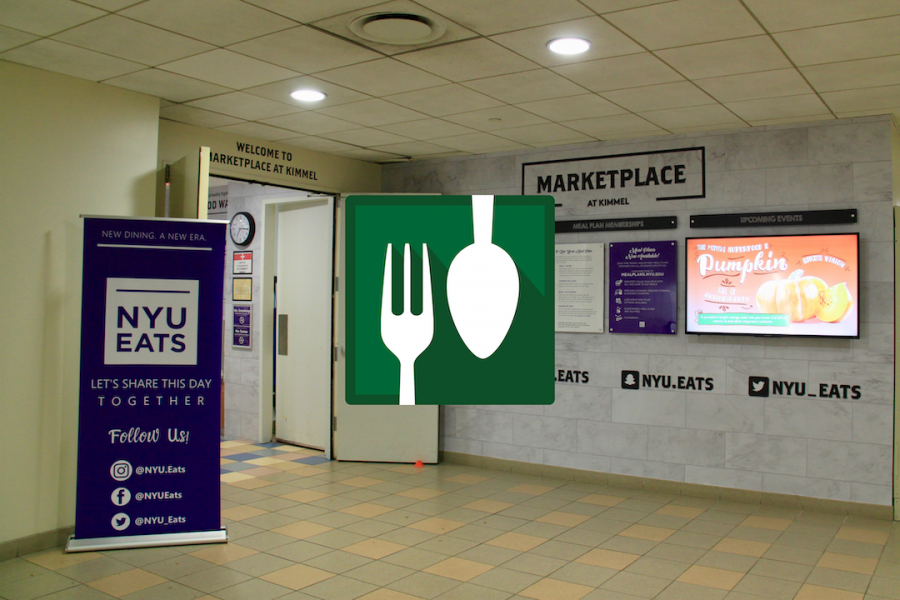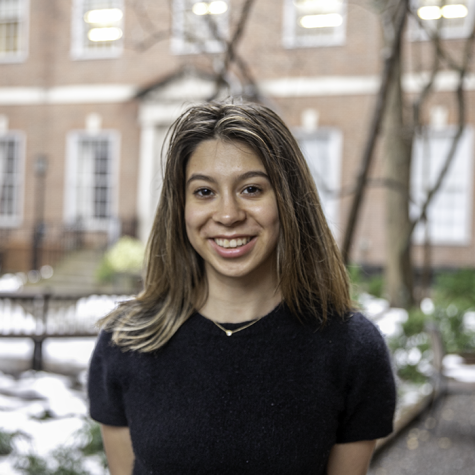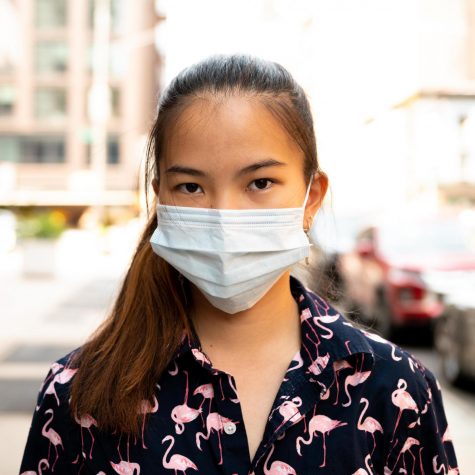NYU Share Meals helped over 4,000 students last semester. This semester, they want to do more
Born out of the app of the same name, NYU Share Meals is working to inform the campus community about food insecurity, while providing a safe space for students who experience food insecurity.
The Share Meals app was created in 2009 by NYU alumni Jonathan Chin. NYU students can donate their meal swipes to those in need. (Staff Photo by Alexandra Chan. Staff Illustration by Alex Tran)
April 29, 2021
We’ve all heard the expression, “I’m a broke college student,” and most of us have even used it to describe our financial limitations that prohibit us from living lavishly. Yet, behind the joking nature of this statement lies a harsh reality of food insecurity that many students have to endure.
It’s an unfortunate reality that exists at NYU, but luckily there’s one club working to address it — NYU Share Meals.
NYU Share Meals was born out of the Share Meals app, developed by NYU alumni Jonathan Chin in 2009 to give students at NYU an opportunity to donate their meal swipes to those in need. The app has since expanded to other campuses across the country.
In addition to this service, Share Meals also tackles the issue of food insecurity, or the lack of steady access to food, in both NYU and New York City. They pursue these goals through various service, educational and advocacy-based initiatives that range from volunteering in soup kitchens to letter-writing campaigns.
Above all, NYU Share Meals aims to create a space for the food-insecure community at NYU. Mehrin Ali, president of the club and a CAS junior, says the university is in desperate need of one.
“This community is so invisible and underrepresented,” said Ali. “People don’t identify as being food insecure as they would as being a person of color. We’re not there at that point in society, but I think with spaces like Shared Meals, we can work towards that kind of atmosphere.”
To foster this community, the club holds regular meetings that often feature game nights and cooking classes to find ways to empower food-insecure students on campus.
According to a 2018 survey from Being@NYU, over 3,000 students reported that they were not able to afford food. Yet, Ali thinks this number is likely higher than reported for two reasons: COVID-19 has created more food insecurity and underreporting due to stigmas surrounding the issue.
“There’s a huge stigma around food insecurity so people aren’t honest due to the stigma attached to it,” said Ali, who admitted that she didn’t even realize she was food insecure until she found out about the club as a first-year student.
“I quickly became involved in the club and educated on what food insecurity was and I was like wow this just describes the entirety of my life,” said Ali. “From there I was passionate about what food insecurity is, how we can combat it, and what resources we need to address it.”
Shamon Lawrence, a sophomore in Steinhardt, is the vice president of NYU Share Meals and serves as Ali’s partner in crime in tackling food insecurity within the NYU community.
“The work I’m doing is what I want to continue: to remember the people who did all this work before us and how we can enhance it,” Lawrence said.
In addition to serving as the vice president of the club, Lawrence serves on the University Senate, representing the food insecure population at NYU. As a senator, Lawrence consistently tries to use his role to advocate for food-insecure students and urge the university to take more responsibility in addressing the issue within its community..
While NYU offers options for food insecure students, like the NYU Courtesy Meal Program, both Ali and Lawrence feel that NYU still isn’t doing enough to address the issue of food insecurity on campus.
“There’s no awareness of food insecurity [on campus] as … we’re the only club that talks about food insecurity,” said Ali. “It’s kind of like us against the world. We’re trying to raise awareness as much as possible.”
“From their perspective, as they are aware the university is doing enough,” said Lawrence. “From the students who experience food insecurity on campus, from the perspective of student leaders here it is a totally different story.”
Ali and Lawrence proceeded to explain that the work NYU Share Meals does is equivalent to that of a Basic Needs Department, which helps students with various needs like housing and food. It’s a lot of work for a club — let alone a club operating in a remote environment during a pandemic.
“It should be the university making an effort and us advising them on that effort and advocating for students on what we want them to do,” said Lawrence. “But it’s been backwards, it’s been the exact opposite of what we want them to do.”
“Shamon and I shouldn’t be doing this. We shouldn’t have this whole community on our backs,” said Ali. “[This is the work of a Basic Needs Department], and we should be the pipeline liaison supporting students.”
The lack of a Basic Needs Department is only one of the demands Ali and Lawrence have of NYU. The other is the establishment of a food pantry that exists as an option for many food insecure students. NYU is the only private university in the city that doesn’t have a food pantry — Columbia has three.
“That’s an embarrassment … there’s 22% of food-insecure students on campus, and the fact that there’s no food pantry is a debacle,” said Ali.
Ali and Lawrence are also requesting more financial backing from the university, which would support their various initiatives like Swipe Authority, a program that allows students to go to various NYU dining halls to donate or receive meals.
Ali and Lawrence said that the campaign assisted more than 4,000 students last fall, which they credit to students spreading the word by mouth or on social media.
“I can only imagine how much it would have done with university backing,” said Ali.
But, despite the lack of university backing, their commitment to tackling this issue motivates them to advocate for the food insecure population at NYU and the wider NYU community.
“Shamon and I are passionate about this so that’s why we give 110 percent,” said Ali. “Our goal is to get going and get the entire NYU community to know what the issue is, what resources there are and that people around us are food insecure.”
Email Gabby Lozano at [email protected].




























































































































































